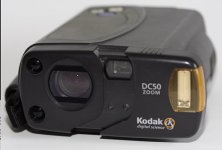markjwyatt
Well-known
For some reason I suspect these are not going to be as celebrated as the first Leica or the first rollfilm camera (for instance). I wonder if there will be forums of some sort for people who use and collect first generation digital cameras? I suspect it will not be as popular as "analog" forums today. For instance I still have an IBM PC Jr. in a box in the garage. No one clamors to own one that I can see.








